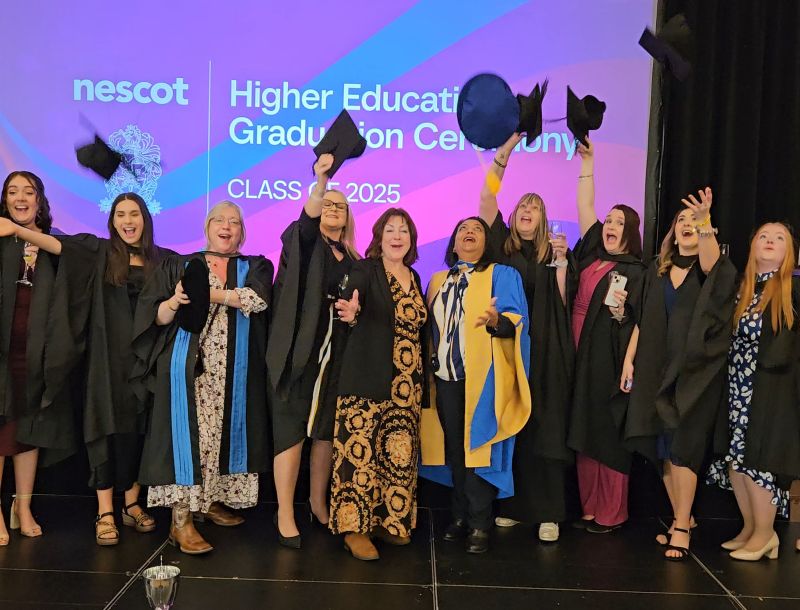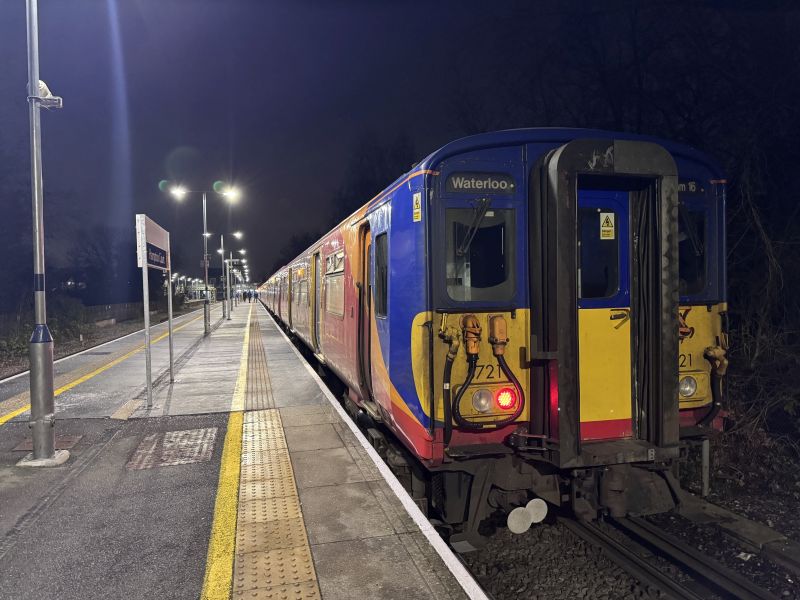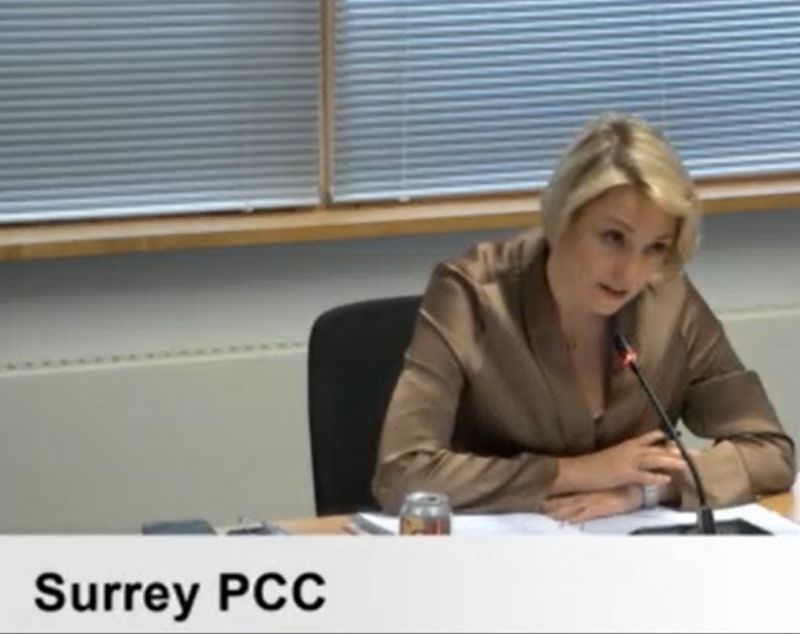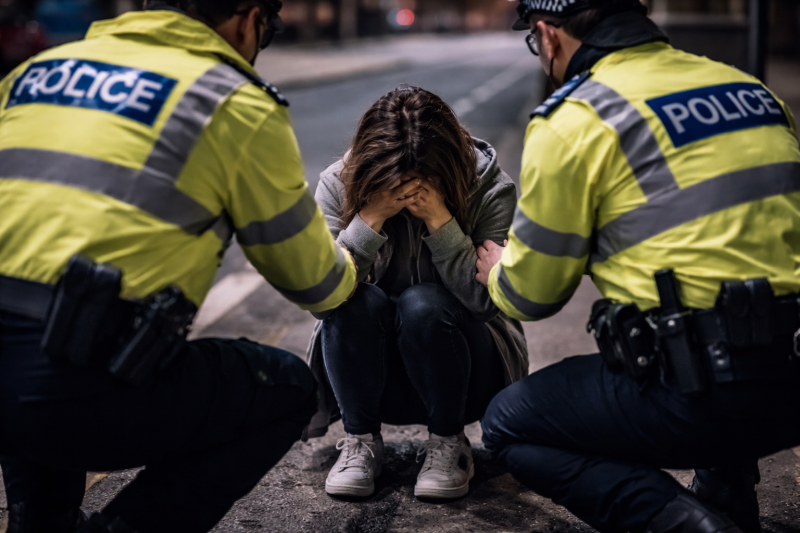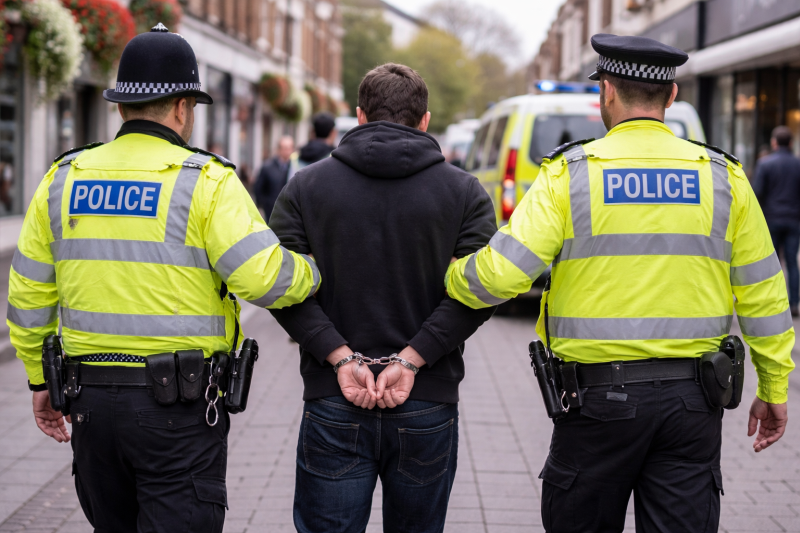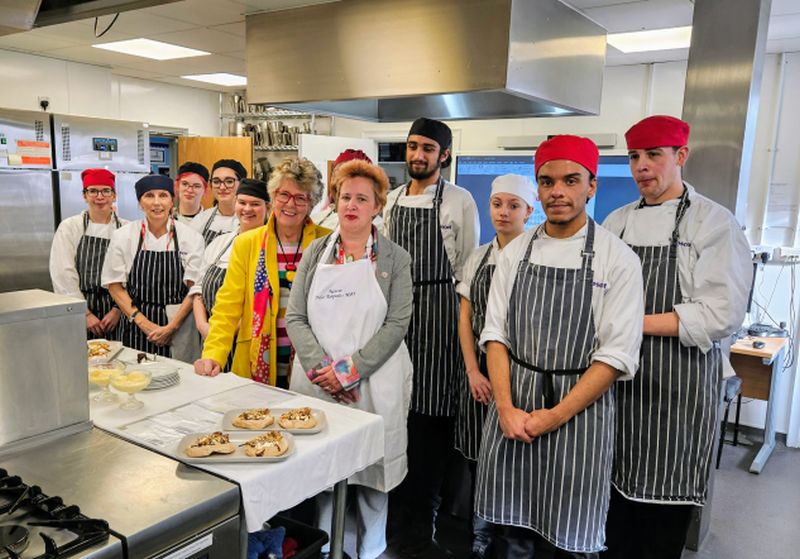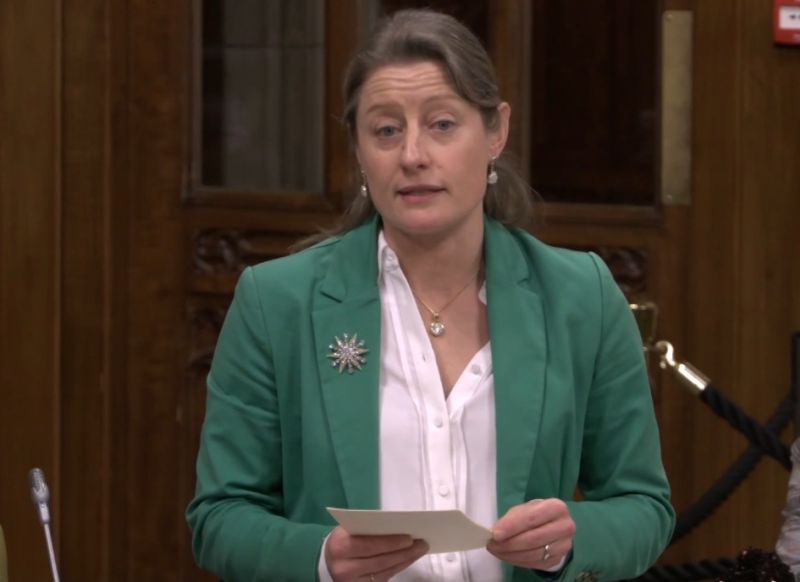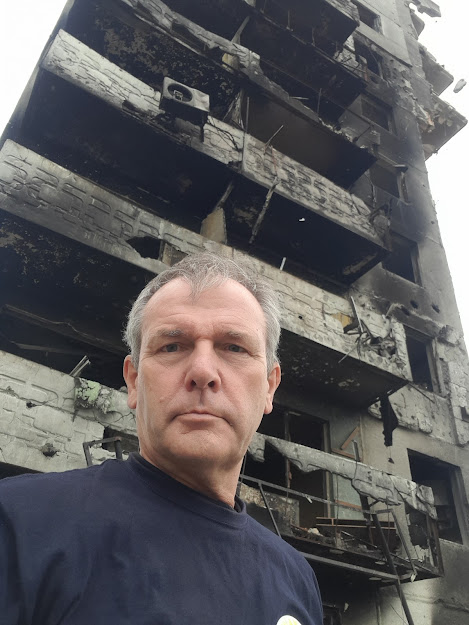Epsom aid hero returns from Ukraine
In an exclusive for Epsom and Ewell Times, we report on Paul Matthews’ (of Lewins Road Epsom) recent experience taking aid provided by Epsom based Surrey Stands With Ukraine [SSWU] to the bombed and neglected Ukrainian Black Sea city of Odessa.
What is it really like to be take humanitarian aid to Ukraine?
Many people have responded to the terrible situation of the war following the invasion by Russia, but what really happens to all that money and donations that are made in the UK?
Paul Matthews returned last week after travelling in a borrowed van packed with generators and medical supplies destined for Odessa on the Black Sea coast.
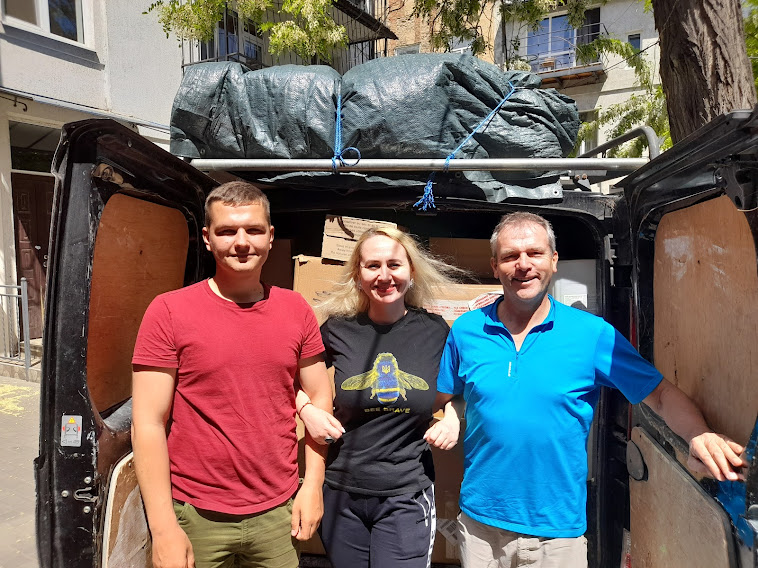
Most aid is handed over at the western border between Poland and Ukraine, but for the 21st supported vehicle to travel for SSWU the plan was to try to take the aid to where it was most needed.
Paul left with with co-driver Alan Avis of The Greenway Epsom and volunteer coordinator of Surrey Stands With Ukraine, for the two days to Krakow and stopping off at a major hub for refugees from Ukraine. This was aid on an industrial scale with a large number of women and children quietly waiting their turn to collect a carrier bag of food and an opportunity to find a pair of shoes for a child or jacket. A phone call with the hosts in Odessa leads to urgent additional supplies filling the van and then the roof rack. The site is open each day, and each family can visit only once a week. Another completely different group will be here tomorrow. What we also learn is that what are the needs in Poland are different to those in the south and east of the country close to the war, and that transport is a key problem, but only one of many.
Poland was the last place to get fuel. Russia destroyed the only refinery in Ukraine, and then targeted the storage facilities, so if you go into Ukraine you need to take all your fuel needs. That meant next stop was finding fuel cans to buy and fill, so with a mixture of 10, 7 and 5 litres cans the day ends with a full tank of 90 litres, and another 192 litres in the back. Time to say goodbye to Alan who flys back from Krakow, and on to the border for Paul.
The plan was for a Ukrainian national to meet and co-drive at the border, and immediately that plan went wrong as he couldn’t get to the border control. With helpful Polish and Ukrainian officials, and a Red Cross sign stuck on the windscreen to enable Paul to drive past miles of waiting traffic he was through in a couple of hours. Then eight hours of driving to Uman before the nighttime curfew started. Uman was the base for two nights with a daytime 3-hour dash to Odessa to drop the aid and leave, but that was just another plan that was not to happen.
On arrival the Odessa lawyers Bar Association gave a warm greeting mixed with a need to get down to the business of offloading and learning about the situation, along with the background wail of an air raid siren…something Paul would soon get used to. And that is when everything changed again. Fuel in Ukraine is difficult to find, and the further away from Poland the situation worsens. Now the group of volunteers who before the war spend their days in court were now feeding and caring for IDPs (Internally Displaced People), who had been forced from their homes or were damaged and now uninhabitable.
Without a working vehicle or fuel to put in it the aid would not be very helpful. So plans changed and Paul was to spend the next week in Odessa and towns to the east. His accommodation was a hotel, but not the one he was booked into on the seaside since missiles had recently destroyed one nearby. So with a change of accommodation, and the trying on of a bullet proof vest and a, “sorry, you can’t keep that it’s needed for someone else”, it was off to find out more of the situation in Odessa.
Over the next week Paul spent time either making aid drops to towns and villages or meeting with other humanitarian aid groups and local volunteers. But there was a troubling question. Where is the international and European aid? Well, not much really. Once past Lviv in the west the presence of organisations from outside Ukraine seem to disappear. In Paul’s time since going south and east he never found another UK or even west European number plate. Only one organisation he met had any external funding, from a charity in Germany.
Local NGO’s (Non-Government Organisations) have sprung up in response to the war in Ukraine. Paul met only Ukrainians who in their previous life were teachers, builders, shop workers or IT engineers, who now were splitting litre bottles of vegetable oil between three families who had arrived from the east. I did eventually bump into an Australian who had arrived last week and was busy helping, and one German TV crew filming a well known shopping centre that had recently been destroyed (and no sign of any military there). For 500 metres all the blocks of flats had shattered windows and frames and were now also deserted and uninhabitable. Two missiles destroyed a shopping centre and made a couple of hundred people homeless. The destruction was in the centre of Odessa, but also in the east and west. Some looked targeted with cruise missiles, and others random. Paul visited a block of flats near the sea hit by a shell from the Russian navy. Just one shell, but as the husband went out to buy food his wife, her mother, and their 3 year old child stayed in, and three generations of a family killed together. Now the block stands empty as the shock wave also badly damaged the block, and even killed a man who was sitting in his van 50 metres in front of the block. Random, and deadly. The situation was best described when asking “if it’s safe?” by the answer “No where is 100% safe.”
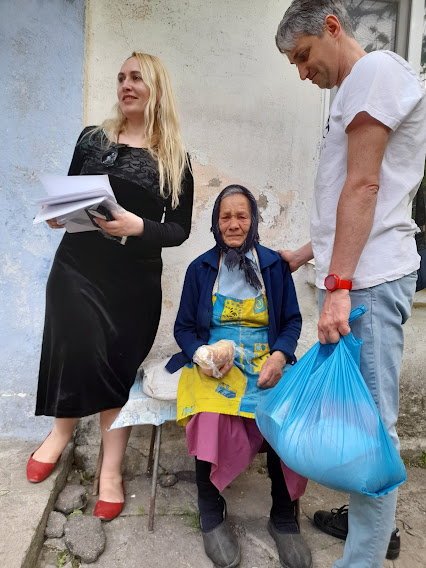
Everywhere Paul went he was met with gratitude and appreciation and often someone wanting to offer a coffee or share whatever little they had. He found himself realising that everyone he met was deeply affected by the war. Either people were also receiving aid, or volunteering to help give aid, and often both. People who helped were scrupulous beyond his expectations at managing the aid received, and this usually was given by other Ukrainians. Whilst some dealt with IDPs others prepared and cooked food and gave it free from soup kitchens sometimes on the street or gave it to volunteers working all hours to help others. Nothing was wasted, and every piece of aid was recorded, listed, and only given after registration and proof that you were a refugee in your own country. No one got angry. No one took more than they could be given. Everything was in short supply and people also had to be turned away. Some NGO’s will only help families with three or more children such is the scale of problem. Others try to help pensioners who can no longer get their medication and try to find donors and pharmacies locally who will donate the drugs.
People have lost jobs. Businesses have closed. Odessa is a vibrant lively summer beach resort. Odessans love their Black Sea and promenade and still go to the beach (especially as it costs nothing). Taking the kids to play in the sand is one of the few possibilities to help the kids forget the war for a few hours, but even that has issues. The main beaches where a sea borne invasion is possible are off limits now with minefields. Even where there are no mines (if the beach is too small), then no one is allowed in the water as it’s heavily mined by both Ukraine and Russia. Mines just under the water regularly end up on the beach. In the meantime a few beach bars open behind the red and white tape to mark the minefield, and children play in the sand in the few feet left before the tape. That is life in Odessa, and then there is the air raid sirens, and occasionally the missiles.
If it is difficult in Odessa it’s worse outside in the smaller towns and villages.
Arriving in Mykoliv, to more air raid sirens, but this time with the almost mechanical sound of thunder. It’s incoming artillery. Landing far enough away that no one runs for the shelters. Those that can wear their body armour. There is an App for everything, and now one that tells you where is being hit, it’s called Liveuamap. A must have for every smart phone here. However, phone and internet signal is not everywhere and in the area you need it most such as the “Grey” zone. Appropriately coloured on the Apps map is not clearly under Russian or Ukranian control. The next stop for the van was to mothers with babies and the elderly in villages that had not seen any aid and with all the men under 60 having left to fight as we were close to the front line. On arrival the village mayor had organised the waiting mothers and elderly, or it required a visit to take the aid to them.
Another place to get too was through a Grey zone corridor to Bashtanka where an Odessa NGO was supporting a church turned into a forward IDP hub. All known as “hubs”, this one was known as the bunker. Paul was shown why. The basement had a large room with bare walls, and here, for three weeks, 120 women, children, babies, and elderly lived. Water was usually carried in buckets. Sanitary situation was bad, and there was not enough room for most people to lie down.
Above them the Russians arrived, and fighting did take place with locals with rifles and burning tyres to try to stop their “liberation”. The area stretching from Donbas and the border with Russia to Odessa is all Russian speaking. Many who can now try to remember to speak only Ukrainian in this dual language country.
The people remained in the bunker of the church praying not to be discovered as the Russians used a tank to hit the village’s main shops in a tiny central area. Where its not burnt out machine gun holes and shrapnel pepper the buildings around and again, glass is everywhere from broken windows and shattered homes, houses, and businesses. Paul was told most people left before the Russians arrived, and then Basktanka had many come from other attacked villages further east. The charity and church run high risk trips in minibuses to collect those wanting to leave from behind Russian lines passing through Ukranian and Russian checkpoints (though the latter usually require a “present”). The church building is quiet now as vehicles had just taken the last group to Odessa and now the kitchen starts preparing food again. Mattresses on floors are packed close together, are tidied and clean sheets put on ready for the next group. In a side room there is a pop-up pharmacy, the only one in the area after the Russians looted and destroyed the local hospital as they retreated a few weeks ago.
Paul and his Ukrainian guide/minder/bodyguard are offered some vegetable soup and coffee before leaving to return to Odessa with an empty van and leave these many locals to their fate. Not long after Paul sees on the App that Basktenka was shelled. The journey back passes lovely countryside, and they stop briefly in Mykolaiv as Andre (name changed) wants to show the city centre and where he used to enjoy summer days and evenings on the Parisian styled boulevards with cobbled streets and boarded up businesses. Around the corner they are stopped from entering and put away phones…this is where a Russian missile hit the high-rise municipal town hall killing 34 office workers and punching a huge hole through the centre of the building. Paul recognises it from the TV pictures back home. At checkpoints they are usually met with a friendly chat, mainly due to being the only UK registered number plate vehicle they have seen.
Paul started his return to Epsom after a week in Odessa and areas east. A near empty van is added to with donations given by his hosts keen for me to bring gifts for SSWU and a jar of Arcasia honey. It is a long way from home now and Paul is alone. The checkpoints thin out between Odessa and Kiev, but you need to be alert. One time Paul saw a small rise in the road and slowed, and found it was the edge of a crater caused by an airstrike on a fortified structure…a bus stop.
Paul’s most memorable meeting was not planned. It happened in a tiny village outside Odessa on one of the aid drops. A young woman wanted to talk and she spoke English. Aged 20 and studying culture at university in Kherson was under attack. She left with student friends and fled to Odessa terrified before it fell to the Russians. Her parents were further east and caught behind the Russian lines and unable to leave. Why was she in this tiny village? Odessa was then attacked from the sea and an invasion expected and her friend asked her to come to stay with her family. Her life is disrupted and twice she has become homeless in two months. It is quiet, cut off, but it feels safe. Throughout she struggles to talk between tears, but wants her story told. She fears for her parents most of all. Every few days a phone call or internet works long enough to talk to them. They ask if she remembers a neighbour who is an elderly man with a small field next the family home. Yes, of course she answers. He was shot tending his vegetables by a Russian sniper. And another woman was walking on the street they live on with her shopping. Shot as well. Others are mentioned. She can not talk anymore.
On the way back from Mykolaiv, Odesa, Kiev, Urpin and everywhere else Paul is thanked for coming and for the aid brought from Surrey. Somehow it doesn’t seem enough.
The aid to Odessa was made possible by donations to Surrey Stands With Ukraine
Donations of money are needed most, to be directed to give immediate humanitarian aid to the oblast (region) of Odessa and it’s villages. Support for this can be made to Surrey Stands With Ukraine
Long term support, in partnership with the UN and others using helicopters is planned, and this can be supported with donations to humanitaid.com
Paul is taking an ambulance to deliver further aid to be used in the Odessa Oblast. Donations for this can be made to Just Giving, Medical Life Lines Ukraine with the reference “Odesa”.









